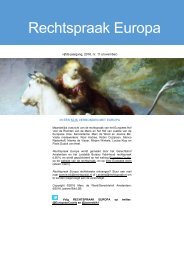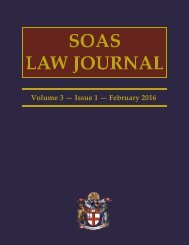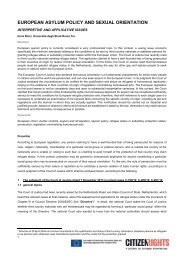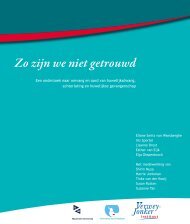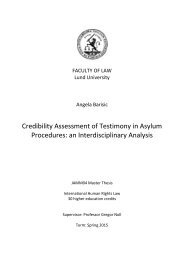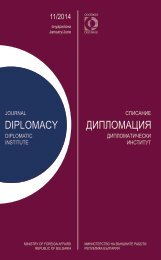AEMI
AEMI-2016-web
AEMI-2016-web
Create successful ePaper yourself
Turn your PDF publications into a flip-book with our unique Google optimized e-Paper software.
162 <strong>AEMI</strong> JOURNAL 2015 2016<br />
job-seekers who no longer retain the<br />
status of workers 10 .<br />
- Students whose primary purpose is<br />
to follow a course of study in the host<br />
Member state.<br />
Some doctrinal works establish a more<br />
precise categorization of economically<br />
inactive Union citizens while reminding<br />
that a single citizen can be at the same<br />
time an economically active and inactive<br />
person. Silvia Gastaldi, for example,<br />
differentiates four categories of economically<br />
inactive Union citizens: job-seekers,<br />
recipients of services under Article<br />
56 TFEU (tourists, recipients of medical<br />
care), students and other economically<br />
inactive Union citizens (pensioners<br />
and poor citizens). She also reminds that<br />
economically inactive citizens are a kind<br />
of sub-category, economically active citizens<br />
being the main category expressly<br />
mentioned in primary and secondary<br />
EU law 11 .<br />
Economically inactive Union citizens<br />
are increasingly enjoying their fundamental<br />
right of freedom of movement<br />
within the territory of the Member<br />
States of the European Union. However,<br />
contrary to workers, they do not benefit<br />
from an unconditional stay in the host<br />
Member state. Their right of residence<br />
for more than three months is indeed<br />
dependent on their possession of sufficient<br />
resources and of a comprehensive<br />
sickness insurance coverage in the host<br />
Member state. Likewise their right to<br />
equal treatment with nationals of the<br />
Member States is not total (contrary to<br />
workers) as their access to social assistance<br />
and to student grants or loans is<br />
conditioned upon the length of their<br />
residence in the host Member state (at<br />
least three months for social assistance<br />
and 5 years for student loans or grants).<br />
This freedom of movement is nevertheless<br />
restricted by some Member<br />
States willing to protect their social<br />
assistance system or public policy in a<br />
time of economic crisis. In the last few<br />
years, a growing number of inactive<br />
Union citizens have been expelled from<br />
their host Member state and this phenomenon<br />
seems to continue.<br />
This article will try to describe the<br />
process of expulsion of economically inactive<br />
Union citizens by quoting in the<br />
first part the main legal grounds for expulsion<br />
used by the Member States and,<br />
in the second part, tools of protection at<br />
the disposal of mobile citizens.<br />
I. Legal Grounds used for the Expulsion<br />
of Economically Inactive<br />
Union Citizens<br />
Directive 2004/38/EC allows host Member<br />
States to terminate the stay of Union<br />
citizens who fall under the legal grounds<br />
for expulsion, such as threat to public<br />
policy, public security and public health<br />
(Articles 27 and 29), abuse of rights or<br />
fraud (Article 35), and unreasonable<br />
burden on the social assistance system<br />
of the host Member States (Article 14).<br />
Theoretically, threat to public policy,<br />
public security and public health, abuse<br />
of rights or fraud may be used indifferently<br />
against workers and economically<br />
inactive citizens while the legal ground<br />
of unreasonable burden concerns only<br />
economically inactive Union citizens. In<br />
practice, the legal grounds of abuse of<br />
rights and threat to public policy is also<br />
regrettably targeting mostly economically<br />
inactive Union citizens as national<br />
practice shows. The first section will deal<br />
with general grounds of expulsion while



